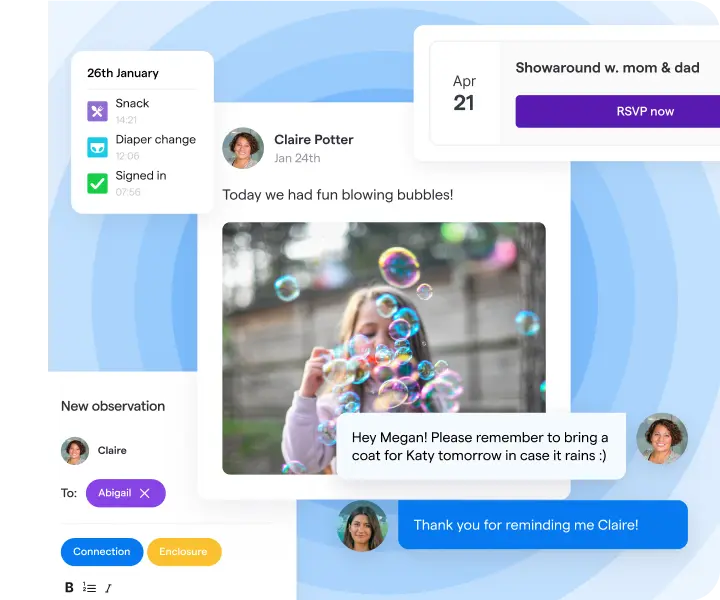settings
children
With Famly since
As an early childhood educator, you are a true superhero, but you're also incredibly busy and short on time. So, adding social media marketing to your already packed schedules might not be…ideal.
But here’s the thing: social media might sound insignificant, but in today's digital age, a strong social media presence is invaluable for not just connecting preschools and childcare centers with their enrolled families, but it’s also becoming a top-tier way to attract prospective parents, build trust, and grow your reputation.
Let’s dig into why social media matters, how to make it work for you, and get social media post ideas that will build that sense of community for current families and prospective families.
Oh, and I should also mention that social media is a great community for early childhood professionals as well. And when we know how lonely of a field this can be, every type of community is worth it.
Why should preschools have a social media presence?
Well, let’s start with the easy facts that make social media marketing a no-brainer for early childhood providers.
- It’s free
- Facebook and Instagram can be managed from one place - less work, double the impact
- In today’s digital world, 67% of US social media users are likely to research something on social media platforms before buying
- It is the ultimate community-builder
That last point is important, and unique to social media, so let’s dive into that more.

Building a sense of community with childcare social media content
Social media isn’t just for memes and dance trends. It’s where your people are: parents of enrolled children and prospective families who want to see what your center is all about. It’s one of the easiest, fastest, and most powerful ways to build a sense of connection and belonging.
Let me pause here for a moment because I really want to highlight just how easy and fast and convenient social media is for childcare providers. Instead of going out and personally meeting every single possible prospective parent (which isn’t exactly realistic), families can easily find your center, and you can have a positive impression before even meeting face-to-face (that comes later!). Having a social presence sparks meaningful connections and saves you time!
And the best, and most valuable part? It’s a two-way street. You can share your story and hear directly from others. Comments and reactions become like support groups, and DMs serve as early interest forms.
1. Build stronger connections with current families
In the world of early education, trust and relationships are everything. Social media gives you a space to show who you are, your center’s values, teaching philosophy, and the meaningful moments in your classroom each day.
Think of social media as a digital window into your classrooms. When parents see their child singing during circle time or proudly holding up a finger painting, it helps them feel more connected and involved, even when they’re not there. It reassures them that their child is learning, playing, and growing in a warm, nurturing space. And that kind of peace of mind? It’s priceless.
These little moments you share all help build trust, spark conversations at home, and deepen that parent-teacher relationship that is so essential to a child’s successful growth and development.
Plus, posting requires no extra thought if you already have a parent communication app with a newsfeed. You can share the favorites on social media (with parents’ permission, of course!).
2. Reach prospective parents and increase enrollment
Thinking of preschool marketing ideas to attract prospective parents doesn’t always have to be a big, expensive to-do. Social media is free, and an effective way to get your center out there.
Whether it’s a quick peek at story time, or a reminder about your upcoming open house, each social media post connects your program with the families interested in joining. Just like parents of enrolled children want a sneak-peek into the quality of care their children are getting, prospective parents want to see the quality of care that their child would get if enrolled. They want to be able to envision their child’s day-to-day, to know what to expect as they enter a new routine and a new environment.
Instead of waiting for new families to walk through your doors, your social media presence keeps you top of mind. When a prospective parent lands on your Instagram or Facebook, they instantly get a feel for your program’s energy, values, daily magic, and the community you’ve created. And you didn’t even have to set up a tour yet!
Sharing what makes your program special – like your play-based philosophy, or your staff that have been around for over 10 years – helps the right families find you. It’s one of the most effective (and affordable) marketing tools you have.
The big ideas

3. Also, find support and community with other educators
While this article is about fostering relationships with families, I do want to point out that social media also provides a platform for early childhood leaders and staff to connect, be inspired and learn from each other. Simply, a digital early childhood network and community.
You’re not alone in this work, but it doesn’t always feel that way. And when you don’t have a ton of free time, meeting friends or your support system for dinner or a yoga class feels impossible. That’s where a digital community can provide some stress relief. Social media is full of other early childhood educators navigating the same triumphs and tough days. Hashtags, comments, and educator-focused accounts become hubs for inspiration and like-minded educators cheering each other on.
Whether it’s swapping classroom setup ideas, finding a funny post that totally gets your day, or connecting with local centers for partnerships and collaboration, social media lets you find your people — the ones who truly get what it means to do this work.
So when we say social media is the ultimate digital community-builder, we mean it. It offers a platform to:
- Strengthen current relationships with parents by offering a window into their child’s day.
- Attract new families by showing what makes your program different.
- The support you need. Find other educators who get it, and are sharing the same wins and worries.
What are the different social media channels for preschools?
Not every platform is a must-do, and honestly, trying to juggle them all is a recipe for burnout. The best social media strategy is one that feels sustainable and connects you with families who are the right fit for your center.

Here's a breakdown of the most popular platforms and how they can serve your preschool:
- Best for: Visual storytelling, parent engagement, community vibes, instant updates, temporary and permanent updates
- Why it works: Parents are already here, scrolling through stories and reels. It’s great for showcasing daily moments, behind-the-scenes photos, and educator spotlights.
- Bonus: Others may tag your center or your location in their posts, which means they’re making content for you. All you need to do is re-post, share, and comment.
- Best for: Sharing updates with current families, building a community, instant updates, temporary and permanent updates
- Why it works: You can create private groups for enrolled families, post events, and even run local ads to boost enrollment.
- Bonus: Older millennial and Gen X parents (aka a big chunk of your primary audience) still love Facebook.
TikTok
- Best for: Reaching younger parents, showing personality, going viral
- Why it works: If you're comfortable on video and want to share playful snippets of life at your center — from classroom hacks to circle time dance breaks — this can be gold.
- Bonus: Authentic content performs best here, so just pull out your phone, press record, and upload. No production needed.
- Best for: Highlighting your professionalism, attracting staff
- Why it works: It’s not where you’ll find prospective families, but it’s great for establishing thought leadership and showing off your amazing team culture.
YouTube
- Best for: Deeper storytelling, virtual tours, or educational content
- Why it works: If you have video capacity and want to go long-form (like showing a full day-in-the-life or giving a virtual open house), this is the place.
- Bonus: Even if you don’t use YouTube regularly, this is the place to have higher quality longer-format content. For instance, an in-depth video tour of your center that you can then embed on your website - which we see a lot, and love!
Quick & easy preschool social media post ideas
Need inspiration to get started? Here are a few ideas of different types of content – no professional photos or graphic design skills required:
- Everyday moments of joy: Candid photos of happy children, learning in action, and tiny teaching moments.
- “A Day in the Life” series: Give a visual walkthrough of what a typical day looks like at your center.
- Student art spotlight: Celebrate creativity with photos and fun quotes from young artists.
- Educator features: Highlight your amazing team and build familiarity with families.
- Behind-the-scenes peeks: Show how your classrooms come together from planning to setup.
- Community shout-outs & questions: Repost local happenings and ask your followers what they'd love to see.
- Share the wins: Post about good news like licensing success, a new playground, or a great review.
- Upcoming events: Get people excited about your open houses and spirit weeks.
- Parent love: Share testimonials and kind words from current families.
No social media influencer needed!
Social media isn’t about being perfect or polished. It’s about being visible. The good news? You don’t have to do it all. Pick one platform. Post when you can. And most of all — let your passion for child development and your center’s values shine through. That’s what parents - current and prospective - are really looking for.
Need help with maintaining a consistent social media presence? We’ve gotten that question a lot, and we’ve got just what you need: Using AI to help boost your preschool’s social media.
Free downloadable Early Childhood resources
Explore our library of longer-form books, guides and editable templates - all free to download.
Explore free resources









